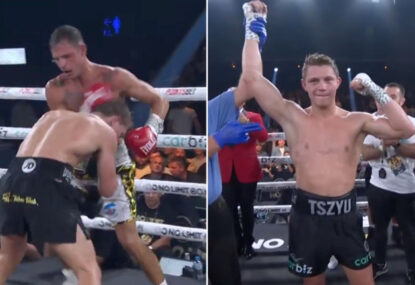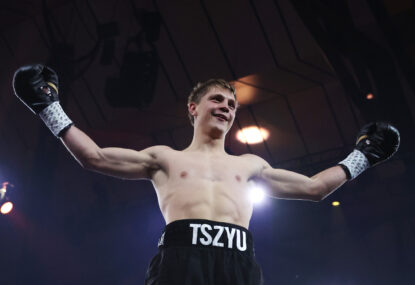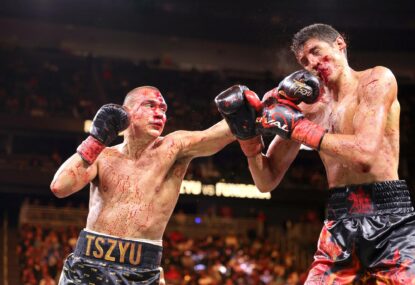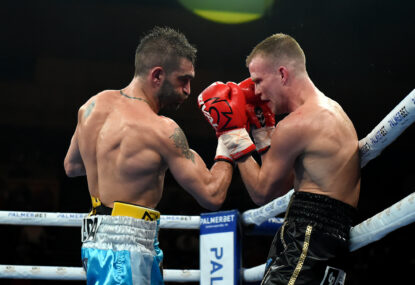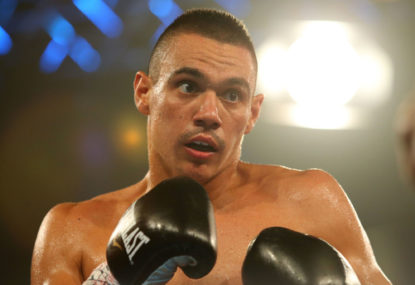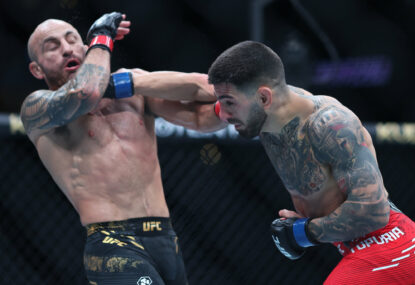Last weekend’s fights were the perfect example of why there has been a major shakeup in the hierarchy of combat sports.
With the first big heavyweight boxing fight for the first time since 2002, it was one of the few yearly highlights for most boxing fans, and while UFC 132 was a good card on paper, most of the fights were for entertainment, not to show off the UFC’s best.
The UFC card was headlined by a bantamweight title fight, with the combatants having one fight between the two of them. They weren’t well known by the casual fans.
The UFC basically brought a knife to a gun fight, but they won easily.
Klitschko versus Haye, a fight that was advertised on pay-per-view as a fight between “two of the greatest fighters in heavyweight history,” went as I feared it would.
Klitschko established the jab early while Haye chose to sit on the outside and use his speed.
Haye’s workrate dropped as the rounds wore on, and instead of stepping up the pace and closing the show like you’d expect from the heavyweight champion of the world, Klitschko just kept jabbing.
The fight went 12 rounds with Klitschko throwing about 30 jabs a round and the odd straight right, while Haye occasionally threw a wild haymaker but seemed happier to lose on points and take his payday.
There were no vicious exchanges on the inside like in the Thrilla in Manila, no skills to marvel at like Billy Conn outboxing Joe Louis in their first fight, or the drama of the late come-from-behind knockout like Louis-Conn or Marciano-Walcott.
The fight was a travesty. Anyone who says different needs to go and watch some boxing from the golden age.
The fight was a typical Klitschko fight, with Wladimir take zero chances and not throwing anything meaningful until his opponent was pretty much falling over from exhaustion.
The only difference in this fight was that his opponent was athletic and didn’t get tired from a slow-paced fight like most of his recent opponents have.
Due to the time difference, I got up at five a.m. and paid $40 to watch this farce, and to say I was disappointed would be an understatement.
“Two of the greatest heavyweights of all-time” could only produce a light spar.
The UFC on the other hand produced fireworks.
UFC 132 saw an evenly matched, hard-fought title fight, the end of the career of one champion and the rebirth of another.
The card was awesome from start to finish with the first televised fight, the comeback of George Sotiropolous from his recent defeat, producing a stunning one-punch knockout (unfortunately for us Australian fans, it didn’t end the way we wanted).
Then following a stand-up clinic from Anthony Njoukuani over Andre Winner, we were treated to a typical Melvin Guillard highlight reel knockout.
The main card started with a third candidate for knockout of the night as Carlos Condit scored a spectacular flying knee knockout over Dong Hyun Kim to move himself into title contention. Tito Ortiz, the original poster boy of the UFC since, scored his first win in five years.
Fan favourite Chris Leben effectively ended the career of MMA legend Wanderlei Silva with a 30-second knockout, and Urijah Faber and Dominic Cruz closed the show with an up-tempo back and forth fight that Cruz won but could have been scored either way.
The card was awesome.
The reason it was awesome is that unlike in boxing, MMA fighters come to fight.
Boxing used to do this. Boxers used to have to fight their way to the top. In America, you had to fight four-rounders, then six, then eight, then ten, and against guys who had an equal chance of beating you and who relied on beating you to feed their family. You sometimes had to do it twice in a month.
It was an environment that weaned out the weak and produced the best. You had to learn how to box in every situation, because you couldn’t avoid boxers who might make you look bad.
Today, some promoter builds up the star before he proves himself, with carefully matched opponents that make him look good, and they often fight just a few times a year.
Then when he fights a live opponent, often they find out that he isn’t the star he was.
If you were a boxer from Australia 50 years ago, you had to win the state title, then the Australian title, then the Commonwealth title, then you’d get a shot at the world title.
Now, very few fighters go for the Australian title, choosing instead to fight handpicked imports for regional belts that teach them nothing but get them ranked, and when they step up, they’re shown up.
MMA may not fight as often as the old pro boxers used to, but they fight tough competition and they will fight whenever they can, often taking fights on short notice.
MMA fighters aren’t paid higher because of their bigger name (well, not to the extent that boxers do) with bonuses often given for putting on an exciting fight or scoring an exciting finish.
The records of MMA fighters aren’t as good looking as boxers, with many fighters suffering losses as they learn their craft, but thats how it used to be in boxing as well.
50 years ago, if you went 40-0 like Floyd Mayweather, everyone knew it was because you hadn’t fought anyone.
Losses make fighters stronger and MMA fighters lose more because they fight opponents who are actually capable of beating them. It’s produced an environment where you have to fight hard to get anywhere in the sport.
Wladimir Klitschko has had 50 professional fights in his career. Out of those he’s won 56, and out of the 59 the Haye fight was probably the first fight he had where he wasn’t overwhelmingly expected to win.
All three of his losses were against fighters who were ridiculously priced underdogs and even his best wins were against fighters who had little chance of beating him.
His fights, especially since he was knocked out by Lamont Brewster, are often boring and frustrating to watch even to Emmanuel Steward (Klitschko’s trainer) who often yells at him between rounds to throw harder punches.
That in a nutshell sums up the state of boxing, when the heavyweight champion of the world is afraid to throw hard punches at his opponent out of fear for getting hit back.
The heavyweight championship of the world in boxing used to be the ultimate prize in sports. If you were the heavyweight champion, you were the toughest man on the planet.
Everyone in the world knew who the heavyweight champion was. That isn’t the case anymore and there’s a very good reason for that.
The heavyweight’s don’t fight like they used to. You’re never going to see a war of the calibre of Ali versus Frazier or Marciano versus Walcott or Louis versus Conn anymore because the heavyweights physically don’t have the conditioning or the toughness to fight a long hard fight, nor the skill level that they used to have.
I love both sports but I’m a boxing fan ahead of MMA. I’ve been following boxing a lot longer and I enjoy watching a great boxing match over a great MMA match.
For a boxing fan like me it’s easy to see why so many people prefer MMA. The first major boxing match I ever watched live was Tyson versus Lewis. That fight certainly wasn’t a classic and there hasn’t been a heavyweight title fight since that would count.
It makes me sad to think that I’ll never get to watch a live boxing match of the magnitude of Ali-Foreman for the heavyweight championship of the world.
The last two UFC heavyweight title fights have not only been fights that I’ve counted the days down to beforehand, but they’ve delivered in the cage.
Klitschko-Haye has all but killed any excitement for any future heavyweight boxing contests I’ll have. I can only imagine how little someone who hadn’t watched much boxing thought of it and that’s the bottom line.
The UFC delivers a lot more then it doesn’t and boxing continues to disappoint.






























































































